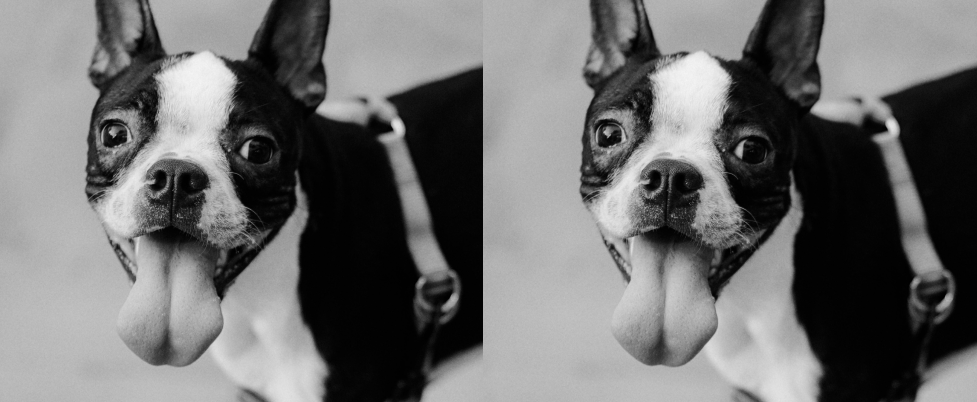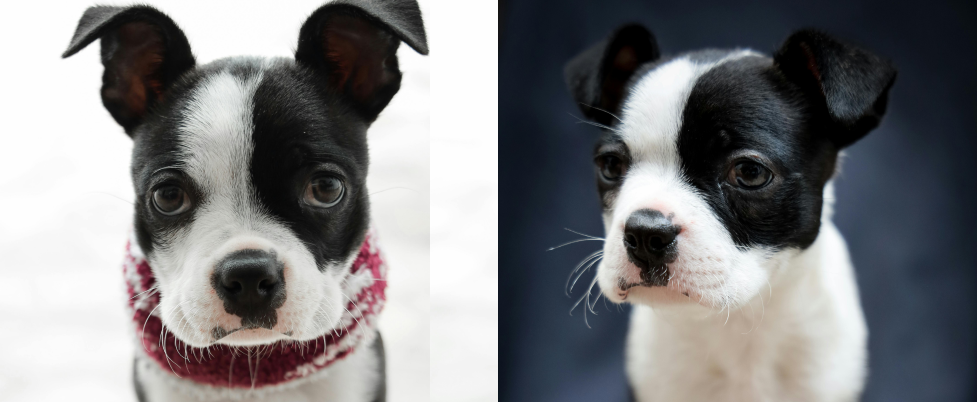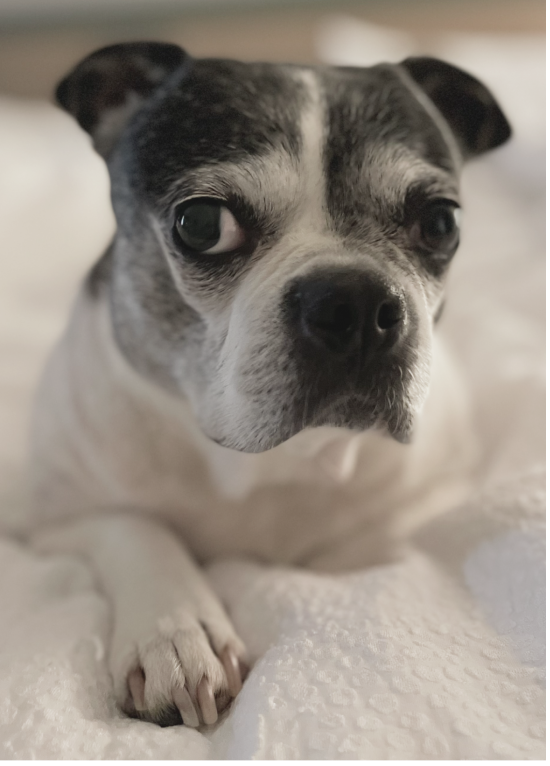LIFE STAGES OF A BOSTON TERRIER / PUPPY POWER

Introduction
Welcoming a Boston Terrier puppy into your home is an exciting experience! These adorable, lively pups need the right care to grow into healthy, happy companions. This guide covers everything you need to know about caring for a Boston Terrier puppy, from nutrition to training and socialization.
Table of Contents
- Understanding Boston Terrier Puppies
- Preparing Your Home for a Boston Terrier Puppy
- Feeding Your Boston Terrier Puppy
- Essential Training Tips
- Socializing Your Puppy
- Health Care Basics
- Grooming Your Boston Terrier Puppy
- Exercise and Playtime Needs
- FAQs About Boston Terrier Puppy Care
1. Understanding Boston Terrier Puppies
Breed Traits
Boston Terrier puppies are known for their playful, intelligent, and affectionate nature. They thrive on human companionship and love being part of family activities. Their lively personalities make them entertaining and fun-loving pets, always ready for a game or cuddle session.
Size
Boston Terriers are a small but sturdy breed. As puppies, they grow quickly and typically reach their full adult weight of 12–25 pounds by around 12 months of age. Their compact build and muscular frame give them a solid, well-balanced appearance.
Temperament
Boston Terrier puppies are friendly, social, and adaptable, making them great companions for individuals and families alike. However, they can also be a little stubborn during training. This independent streak means they respond best to positive reinforcement, patience, and consistency. Early socialization and obedience training will help them develop into well-mannered adult dogs. Despite their occasional stubbornness, they are eager to please and form strong bonds with their owners.
2. Preparing Your Home for a Boston Terrier Puppy
Puppy-Proofing Tips
Boston Terrier puppies are curious and energetic, so taking steps to puppy-proof your home is essential for their safety. Here are some key precautions to take:
- Remove hazards – Store away small objects, shoes, and anything that could be chewed, swallowed, or knocked over. Puppies love to explore with their mouths!
- Use baby gates – Block off stairs and rooms that are unsafe or not puppy-friendly. This helps prevent accidents while they learn their way around.
- Secure electrical cords – Puppies might be tempted to chew on dangling wires, which can be dangerous. Use cord protectors or keep them tucked away.
- Store toxic items out of reach – Many common houseplants, cleaning supplies, and human foods can be harmful to dogs. Keep these in high places or behind closed doors.
Essential Supplies
To ensure your Boston Terrier puppy feels comfortable and secure in their new home, have these must-have supplies ready:
- Crate or puppy bed – A crate provides a safe space for your puppy to rest and helps with housetraining. Choose a cozy bed for extra comfort.
- Food and water bowls – Opt for stainless steel or ceramic bowls to prevent tipping and bacteria buildup.
- Puppy food – Start with high-quality, breed-appropriate food to support their growth and development. Consult your vet for recommendations.
- Chew toys and training treats – Boston Terrier puppies love to chew, especially while teething. Provide safe, durable toys and small treats for reward-based training.
- Collar, leash, and ID tags – A well-fitted collar with identification tags is crucial in case your puppy ever gets lost. A lightweight leash will help with early leash training.
By setting up a safe and welcoming environment, you’ll create the perfect foundation for a happy, healthy, and well-adjusted Boston Terrier puppy.
3. Feeding Your Boston Terrier Puppy
Proper nutrition is essential for your Boston Terrier puppy’s growth, energy, and overall health. Since Boston Terriers are a small breed with a moderate energy level, they require a well-balanced diet that supports their development without leading to overeating or weight gain.
Diet Basics
- Choose high-quality puppy food – Look for small breed-specific formulas that provide essential nutrients, including protein, healthy fats, and vitamins for proper growth.
- Stick to a feeding schedule – Puppies should eat 3–4 smaller meals per day to maintain stable energy levels and prevent overeating. As they grow, you can transition to two meals per day around 6 months old.
- Provide fresh water at all times – Keep a clean bowl of fresh, cool water available throughout the day to keep your puppy hydrated.
Foods to Avoid
Boston Terrier puppies have sensitive stomachs, so it’s crucial to avoid harmful and difficult-to-digest foods:
- Toxic foods – Grapes, raisins, chocolate, onions, garlic, avocados, and certain artificial sweeteners (like xylitol) can be extremely dangerous for dogs.
- Dairy and fatty foods – Many dogs are lactose intolerant, so avoid giving them milk, cheese, or butter. Fatty or greasy human food can also cause digestive issues.
- Bones and processed meats – Cooked bones can splinter, leading to choking or internal injuries. Processed meats like bacon or deli meats are too salty and may contain harmful preservatives.
- Excessive table scraps – Rich or heavily seasoned human food can upset their stomach and contribute to weight gain and bad eating habits.
By providing a nutritionally balanced diet and avoiding harmful foods, you’ll help your Boston Terrier puppy grow into a healthy and happy adult dog.
Don’t feed your dog these foods
AKC – Don’t feed your dogs these foods
Human food dogs can and can’t eat
AKC – People food dogs can’t eat
Pet poison helpline
4. Essential Training Tips
Training your Boston Terrier puppy early on will help shape them into a well-behaved and confident companion. Since Boston Terriers are intelligent but sometimes stubborn, consistency and positive reinforcement are key to successful training.
Crate Training
A crate provides your puppy with a safe and comfortable space while also helping with housetraining and preventing destructive behavior.
- Make it inviting – Place a soft blanket and a toy inside to make the crate cozy.
- Introduce it gradually – Allow your puppy to explore the crate without pressure. Offer treats and praise when they enter voluntarily.
- Use short sessions – Start with a few minutes at a time, increasing duration gradually. Never use the crate as punishment.
Housetraining
Boston Terriers are eager to please, but they need a consistent routine to learn proper potty habits.
- Follow a schedule – Take your puppy outside frequently, especially after meals, naps, and playtime.
- Choose a designated potty area – Using the same spot helps them associate the location with going to the bathroom.
- Reward success – Give immediate praise and a small treat when your puppy goes in the right spot. Avoid punishment for accidents—redirect them instead.
Basic Commands
Teaching foundational commands early will make daily interactions easier and strengthen your bond.
- Start with “sit,” “stay,” and “come” – These commands provide structure and safety. Use treats and enthusiastic praise to encourage learning.
- Keep it short and positive – Boston Terrier puppies have short attention spans, so keep training sessions 5–10 minutes long to maintain engagement.
- Be patient and consistent – Repetition and daily practice will help reinforce their learning.
With gentle guidance, consistency, and lots of praise, your Boston Terrier puppy will quickly develop good habits and become a well-mannered companion.
5. Socializing Your Puppy
Proper socialization is one of the most important aspects of raising a well-adjusted Boston Terrier. Exposing your puppy to different people, pets, and environments early on helps them grow into a confident, friendly, and well-mannered adult dog.
Why It’s Important
- Prevents fear and aggression – Puppies that aren’t socialized properly may develop anxiety, fearfulness, or aggression toward unfamiliar people, animals, or situations.
- Encourages adaptability – A well-socialized Boston Terrier will be comfortable in new settings, whether it’s a busy park, a vet visit, or meeting new friends.
- Strengthens their bond with you – Positive interactions with the world around them build their trust and confidence, making them happier and more outgoing companions.
How to Socialize
- Expose them to new experiences gradually – Introduce your puppy to different people, pets, sounds, and places in a calm and controlled manner. Avoid overwhelming them with too much at once.
- Use positive reinforcement – Reward your puppy with treats, praise, and affection when they remain calm and behave well in new situations. This helps them associate new experiences with positive outcomes.
- Arrange playdates with friendly dogs – Safe, supervised interactions with well-socialized dogs will help your puppy learn appropriate doggy manners.
- Take short outings – Bring your puppy on walks in different areas, visit a pet-friendly store, or let them explore a new part of your home.
- Introduce new sounds and textures – Let your puppy experience various surfaces (grass, tile, pavement) and become comfortable with common household noises like vacuums or doorbells.
By making socialization a fun and positive experience, you’ll help your Boston Terrier grow into a friendly, confident, and well-adjusted companion.
6. Health Care Basics for Your Boston Terrier Puppy
Keeping your Boston Terrier puppy healthy requires regular vet checkups, vaccinations, and preventive care. Establishing a good healthcare routine early on will help ensure a long, happy life for your furry friend.
Vet Visits
- First Checkup – Schedule your puppy’s first vet appointment within a week of bringing them home. This initial visit helps confirm their health, establish a vaccination plan, and address any concerns.
- Vaccination Schedule – Puppies need a series of vaccinations to protect them from common diseases like parvovirus, distemper, and rabies. Your vet will provide a customized vaccination plan based on your puppy’s age and risk factors.
- Regular Exams – After the initial visits, your puppy should have annual wellness checkups to monitor their growth and overall health.
Preventive Care
- Deworming & Parasite Prevention – Puppies are often dewormed multiple times in their early months. Your vet may also recommend flea, tick, and heartworm preventatives to keep parasites at bay.
- Dental Health – Boston Terriers can be prone to dental issues, so start early with vet-approved dental chews or brushing to maintain healthy teeth and gums.
- Ear & Eye Care – Due to their prominent eyes and short noses, Boston Terriers may be more prone to eye infections or respiratory issues. Regular vet visits and gentle eye cleaning can help prevent problems.
- Spaying & Neutering – Your vet may recommend spaying or neutering your puppy around 6–9 months old, which can prevent certain health issues and unwanted behaviors.
By staying proactive with vet visits and preventive care, you’ll help your Boston Terrier puppy grow into a healthy, happy companion.
Dog vaccinations a complete guide – be.chewy
Complete guide to first-year puppy vaccinations
7. Grooming Your Boston Terrier Puppy
Boston Terriers have a short, smooth coat that’s relatively low-maintenance, but regular grooming is still important for their overall health and well-being. Establishing a consistent grooming routine early will help keep your puppy comfortable and looking their best.
Coat Care
- Brush weekly – Even though Boston Terriers don’t shed excessively, a soft-bristle brush or grooming mitt helps remove loose fur, distribute natural oils, and keep their coat shiny.
- Bathe when necessary – Use a gentle, puppy-safe shampoo for occasional baths, especially if they get dirty or start to smell. Overbathing can strip their skin of natural oils, so aim for once every 4–6 weeks or as needed.
- Wipe their face folds – Some Boston Terriers have slight wrinkles or facial folds that can trap dirt and moisture. Use a damp cloth or pet-safe wipe to clean these areas and prevent irritation.
Nail Care
- Trim every 2–3 weeks – Long nails can cause discomfort and affect their walking. Use puppy-safe nail clippers or a nail grinder to keep them short and smooth.
- Introduce nail trimming gradually – If your puppy is nervous, start by touching their paws and rewarding them before attempting a trim. Take it slow and use positive reinforcement.
Dental Care
- Brush their teeth regularly – Dental health is crucial, as small breeds like Boston Terriers are prone to plaque buildup and gum disease. Brush their teeth 2–3 times a week using a dog-safe toothbrush and toothpaste (never use human toothpaste!).
- Provide dental chews – Offering vet-approved dental treats or toys can help keep their teeth clean and strengthen their gums.
By maintaining a simple but consistent grooming routine, you’ll keep your Boston Terrier puppy healthy, comfortable, and looking great!
8. Exercise and Playtime Needs
Boston Terrier puppies are playful and energetic, but they don’t require intense exercise like some other breeds. Because they are a brachycephalic (short-nosed) breed, they can be prone to breathing difficulties, so it’s important to provide the right balance of activity and rest.
Energy Levels
- Boston Terrier puppies have bursts of energy but also need plenty of naps to recharge.
- They enjoy playtime and short walks but can tire quickly, especially in warm weather.
- Mental stimulation is just as important as physical exercise to keep them engaged and prevent boredom.
Daily Activities
- Short walks – Two or three 10–15 minute walks per day are ideal for exercise and socialization.
- Interactive play – Games like fetch, tug-of-war, and hide-and-seek help burn off energy while keeping your puppy mentally engaged.
- Indoor play – Boston Terriers adapt well to apartment living and enjoy chasing soft toys or playing with puzzle feeders indoors.
- Training sessions – Incorporating obedience training into playtime is a great way to reinforce commands while keeping their mind active.
Exercise Precautions
- Avoid overexertion – Due to their short snouts, Boston Terriers can struggle with heat exhaustion and breathing difficulties. Exercise them in cooler parts of the day, and watch for signs of fatigue like panting, excessive drooling, or slowing down.
- Be mindful of rough play – Boston Terrier puppies are small but sturdy. However, avoid jumping from high surfaces or intense roughhousing, as they can be prone to joint issues and injuries.
With the right mix of short walks, fun games, and mental enrichment, your Boston Terrier puppy will stay happy, healthy, and well-stimulated!
9. FAQs About Boston Terrier Puppy Care
Q: When can I start training my Boston Terrier Puppy?
Start basci training as early as 8 weeks old. Puppies at this age are eager to learn, and early training helps establish good habits. Use positive reinforcement with treats and praise.
Q: How do I manage their teething phase?
Boston Terrier puppies go through a teething phase between 3-6 months old. To soothe sore gums, provide durable chew toys, frozen carrots, or frozen wet washcloths. Avoid letting them chew on furniture or shoes by redirecting them to appropriate toys.
Q: Are Boston Terrier puppies good with kids?
Yes! Boston Terriers are affectionate, playful, and gentle, making them great companions for children. However, always supervise interactions to ensure that both the puppy and the child learn to interact respectfully.
Q: How often should I bathe my puppy?
Bathe your puppy once a month or as needed, using a puppy-safe shampoo. Over-bathing can strip their skin of natural oils, leading to dryness and irritation. In between baths, wiping them down with a damp cloth can help keep them clean.
Q: Do Boston Terriers shed a lot?
No, Boston Terriers have a short, smooth coat and are considered low to moderate shedders. Weekly brushing helps minimize shedding and keeps their coat healthy.
Q: How much exercise does a Boston Terrier puppy need?
Boston Terrier puppies need about 3-45 minutes of daily activity, split into short walks and play sessions. Be mindful of overexertion, especially in hot weather, due to their brachycephalic (short-nosed_ nature.
Q: Are Boston Terriers prong to health issues?
Yes, they can be prone to brachycephalic-related breathing problems, eye issues, and skin allergies. Regular vet checkups, a healthy diet, and moderate exercise can help prevent common health concerns.
Q: Can Boston Terrier puppies be left alone?
Boston Terriers are companion dogs and don’t do well when left alone for long periods. If you need to leave, crate training and interactive toys can help keep them occupied and prevent separation anxiety.
Conclusion:
Caring for a Boston Terrier puppy is a joyful journey filled with challenges and rewards. With proper training, socialization, and love, your pup will grow into a loyal and loving companion!

Other articles by this author

“Hi! I’m Weezie, a spirited Boston Terrier / French Bulldog mix and self-proclaimed expert on everything Boston.